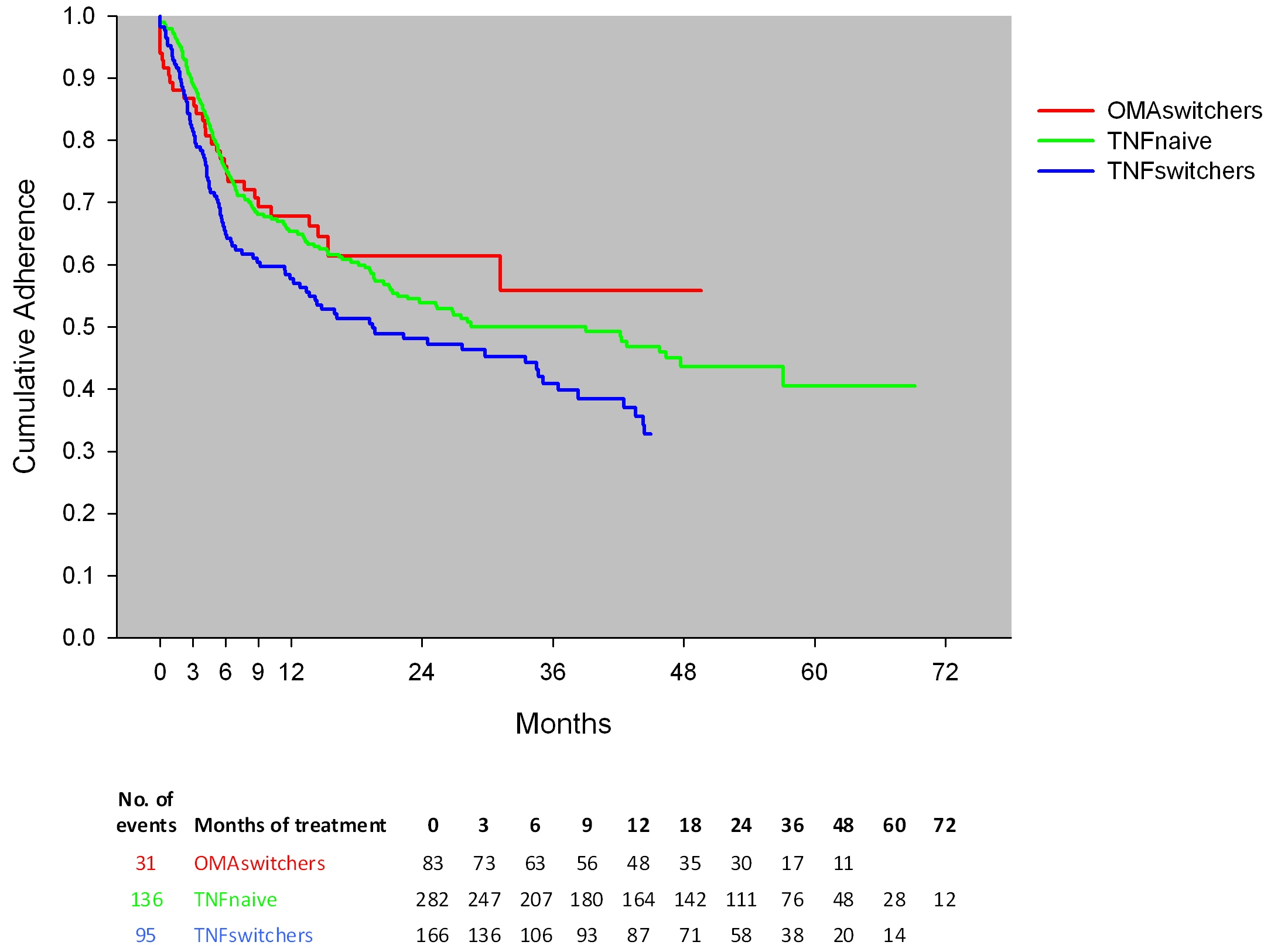Session Information
Session Type: ACR Poster Session A
Session Time: 9:00AM-11:00AM
Background/Purpose: About 30% of patients receiving biologic therapy do not have
concomitant conventional synthetic DMARDs (csDMARDs). Little is known about the
role of different mode of actions when switching biologic therapy. The
objective of the present study was to evaluate the impact of anti-TNF and other
modes of action on drug adherence in RA patients switching monotherapy.
Methods: All RA patients registered in a
regional biologic DMARD (bDMARD) database as initiating bDMARD as monotherapy,
i.e. without concomitant csDMARDs, from 1st of January 2006 through
31st of December 2012, were eligible for inclusion. After initiation
of the first dose of biologic monotherapy, drug adherence for biologic naïve
patients receiving anti-TNF and for patients switching to 2nd course
of anti-TNF or a different bDMARD was estimated using life-table technique.
Results: A total of 531 patients with RA
were included (80% women, disease duration: mean 12.6 [SD 11.5]), age: mean
56.7 years [SD 14.1], no. of previous DMARDs: median 3.0 [IQR 2.0 to 5.0], EQ-5D:
median 0.52 [IQR 0.16 to 0.66], and DAS28: mean 5.0 [SD 1.3]). There was a statistically
significant difference in drug adherence when comparing anti-TNF switchers (n=166)
to those switching to other modes of action (OMA switchers) (n=83) (p=0.02) (see
Figure). There was no statistically significant difference between anti-TNF
naïve patients (n=282) and OMA switchers (p=0.30) (see Figure).
Conclusion: When switching to other
modes of action biologics after anti-TNF failure, drug adherence was as good as
when treated with an anti-TNF as 1st course. However, switching to a
2nd anti-TNF showed significantly inferior drug adherence rates
compared to bDMARDs with other modes of action. This suggest that bDMARDs with
other modes of action should be considered as the first choice for patients not
tolerating csDMARDs and who have had an inadequate response to their first
anti-TNF agent.
Figure: Drug adherence of anti-TNF and other modes of action on drug
adherence in RA patients switching monotherapy.
To cite this abstract in AMA style:
Jørgensen TS, Turesson C, Kapetanovic MC, Englund M, Turkiewicz A, Christensen R, Bliddal H, Geborek P, Kristensen LE. Is Mode of Action Important When Switching Biologic Monotherapy in Rheumatoid Arthritis? Drug Adherence Results from the Swedish Ssatg Registry [abstract]. Arthritis Rheumatol. 2015; 67 (suppl 10). https://acrabstracts.org/abstract/is-mode-of-action-important-when-switching-biologic-monotherapy-in-rheumatoid-arthritis-drug-adherence-results-from-the-swedish-ssatg-registry/. Accessed .« Back to 2015 ACR/ARHP Annual Meeting
ACR Meeting Abstracts - https://acrabstracts.org/abstract/is-mode-of-action-important-when-switching-biologic-monotherapy-in-rheumatoid-arthritis-drug-adherence-results-from-the-swedish-ssatg-registry/

